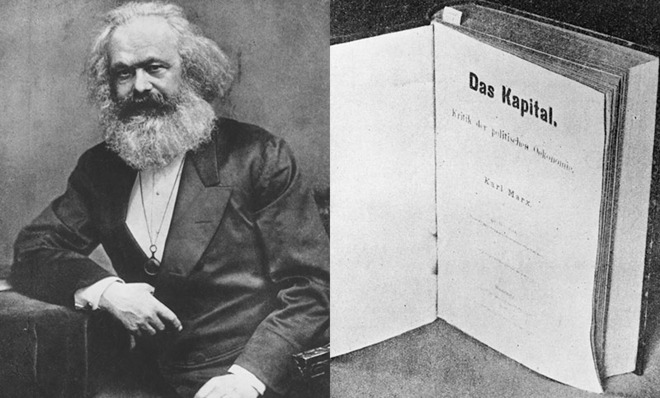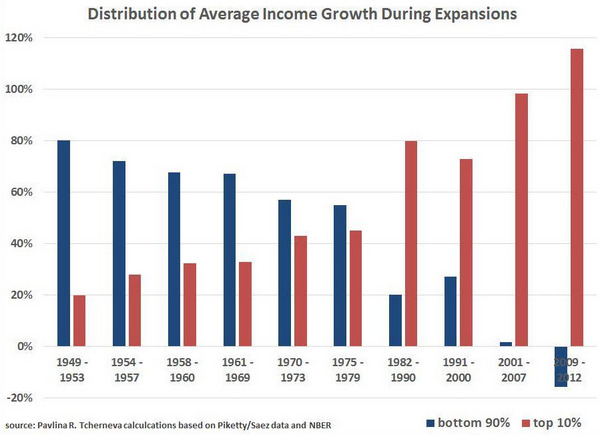What Karl Marx can teach us in 2014
The economist wasn't always right. But his vision of capitalism is looking alarmingly close.


For most of the 20th century, favorably mentioning the works of Karl Marx has been a quick road to being run out of polite society in the United States. But I've just finished a long trip through the first volume of Das Kapital, as well as several of his other works, and at the risk of tempting the RedScareBot, I think there are some genuinely valuable insights to be had in 2014, almost 150 years after it was first published.
Marx has been maligned mainly by association with the totalitarian dictatorship of the Soviet Union. However, Das Kapital, like most of his work, is a descriptive account of how capitalist institutions would change the politics and economy of a nation. As such a work, I see three main areas where Marx's insights are still worth considering.
First, income distribution. Marx thought that capitalism would necessarily lead to impoverishment of the masses. The greater the extent of capitalist development, he argued, the greater the poverty in the working class. In the 1950s, this would have seemed preposterous. But something has been happening to the distribution of American economic growth (graph courtesy of Pavlina Tcherneva):
The Week
Escape your echo chamber. Get the facts behind the news, plus analysis from multiple perspectives.

Sign up for The Week's Free Newsletters
From our morning news briefing to a weekly Good News Newsletter, get the best of The Week delivered directly to your inbox.
From our morning news briefing to a weekly Good News Newsletter, get the best of The Week delivered directly to your inbox.

The striking thing about this trend is how consistent it is. Each postwar economic expansion, almost without exception, distributes fewer and fewer of its fruits to the bottom 90 percent of the population. In the most recent one, the bottom 90 percent has gotten less than nothing on average (before taxes and transfers).
Not coincidentally, during this time the government underwent a neoliberal revolution. This set of basically orthodox capitalist policies involved cutting taxes on the rich, especially capital gains; obliterating most labor unions; making more and more social insurance contingent upon work; expanding access to credit, and so on. And presto, we got humongous and growing inequality.
This ties in neatly with the second point: Marx's views on ideology. He argued that essentially all beliefs emanated from the structure of a nation's economy, and that capitalism would obliterate all the old ideologies: "All that is solid melts into air, all that is holy is profaned," he and Engels famously wrote in The Communist Manifesto. The strong version of this thesis is clearly false — in particular, he radically underestimated the staying power of religion, not to mention nationalism and racism — but it does have some explanatory power.
Today we see this most strongly, I think, in the way world elites have behaved towards social insurance programs. Marx thought it was clearly possible to buy off the masses with transfers and social insurance, but that elites wouldn't do this because they would be hemmed in by galloping Ayn Rand-style self-legitimization. Most of the postwar 20th century seemed to prove him wrong, as nations across the world instituted generous social insurance.
A free daily email with the biggest news stories of the day – and the best features from TheWeek.com
But after the fall of the Soviet Union and especially after the 2008 crisis, events have been breaking down more Marx's way. In the face of a historic collapse of high capitalist institutions, right-wingers quickly regrouped and began demanding basically the whole welfare state be burnt with fire. Worse, centrist elites in practically every industrialized country developed a maddening and incomprehensible fixation with austerity, especially cutting social insurance. (ObamaCare being the important exception.) Only nutty right-wing intransigence kept Social Security and Medicare from deep cuts here in the U.S. And in Europe, elites have savaged their citizenry with almost unremitting cruelty.
Crude classist explanations of this behavior aren't convincing. But I do think there's something to the idea that the rich have become so enamored with a self-legitimizing ideology that they've grown complacent to the dangers of mass unemployment — even to their own position. Marx was right that mass unemployment is inherently destabilizing to societies; it might take the form of a nationalist, rather than socialist, movement — Hitler, after all, came to power in the midst of a depression — or something else entirely. But joblessness breeds a dangerous instability that can't be ignored.
Finally, there's Marx's account of capitalist crises. He argued that ruthless competition would cause increasingly bad economic crises because of overproduction and a corresponding collapse in profits (anticipating Keynes in many respects).
Once again, he seems partly wrong: today, profits are at records highs (which makes an interesting contrast with Piketty's work). But whether an economic crisis is accompanied by gargantuan corporate profits or by their collapse makes little difference to the people thrown out of work. The events of 2008 revealed previous smug assertions that all the problems with market institutions had been solved are a farce, and that capitalist nations have not permanently handled the problem of depression. Again, he was not wholly right. But he was on to something.
In the end, Marx is an interesting and worthwhile read with some dubious bits. But if you look past the way-too-elaborate metaphysics and some of the failed historical predictions, you find a subtle, incisive thinker. While his picture of the future of capitalism was not perfect, it's looking close enough that today's elites ought to be a lot more worried than they are.
Ryan Cooper is a national correspondent at TheWeek.com. His work has appeared in the Washington Monthly, The New Republic, and the Washington Post.
-
 Grok in the crosshairs as EU launches deepfake porn probe
Grok in the crosshairs as EU launches deepfake porn probeIN THE SPOTLIGHT The European Union has officially begun investigating Elon Musk’s proprietary AI, as regulators zero in on Grok’s porn problem and its impact continent-wide
-
 ‘But being a “hot” country does not make you a good country’
‘But being a “hot” country does not make you a good country’Instant Opinion Opinion, comment and editorials of the day
-
 Why have homicide rates reportedly plummeted in the last year?
Why have homicide rates reportedly plummeted in the last year?Today’s Big Question There could be more to the story than politics
-
 The billionaires’ wealth tax: a catastrophe for California?
The billionaires’ wealth tax: a catastrophe for California?Talking Point Peter Thiel and Larry Page preparing to change state residency
-
 Bari Weiss’ ‘60 Minutes’ scandal is about more than one report
Bari Weiss’ ‘60 Minutes’ scandal is about more than one reportIN THE SPOTLIGHT By blocking an approved segment on a controversial prison holding US deportees in El Salvador, the editor-in-chief of CBS News has become the main story
-
 Has Zohran Mamdani shown the Democrats how to win again?
Has Zohran Mamdani shown the Democrats how to win again?Today’s Big Question New York City mayoral election touted as victory for left-wing populists but moderate centrist wins elsewhere present more complex path for Democratic Party
-
 Millions turn out for anti-Trump ‘No Kings’ rallies
Millions turn out for anti-Trump ‘No Kings’ ralliesSpeed Read An estimated 7 million people participated, 2 million more than at the first ‘No Kings’ protest in June
-
 Ghislaine Maxwell: angling for a Trump pardon
Ghislaine Maxwell: angling for a Trump pardonTalking Point Convicted sex trafficker's testimony could shed new light on president's links to Jeffrey Epstein
-
 The last words and final moments of 40 presidents
The last words and final moments of 40 presidentsThe Explainer Some are eloquent quotes worthy of the holders of the highest office in the nation, and others... aren't
-
 The JFK files: the truth at last?
The JFK files: the truth at last?In The Spotlight More than 64,000 previously classified documents relating the 1963 assassination of John F. Kennedy have been released by the Trump administration
-
 'Seriously, not literally': how should the world take Donald Trump?
'Seriously, not literally': how should the world take Donald Trump?Today's big question White House rhetoric and reality look likely to become increasingly blurred
